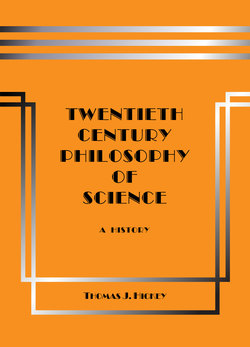Читать книгу Twentieth-Century Philosophy of Science: A History (Third Edition) - Thomas J. Hickey - Страница 85
На сайте Литреса книга снята с продажи.
4.05 Aim of Maximizing “Explanatory Coherence”
ОглавлениеThagard: Computational philosopher of science Paul Thagard proposes that the aim of science is “best explanation”, a thesis that is also called “explanationism”. The thesis refers to an explanation that aims to maximize the explanatory coherence of one’s overall set of beliefs. This aim of science is thus explicitly a coherence agenda.
Thagard developed a computerized cognitive system ECHO, an acronym for “Explanatory Coherence by Harmony Optimization”, in order to explore the operative criteria in theory choice by mechanically simulating noteworthy past episodes in the history of science. His system described in his Conceptual Revolutions simulated the realization of the aim of maximizing “explanatory coherence” by replicating various episodes of theory choice. In his system “explanation” is an undefined primitive term. He applied his system ECHO to several revolutionary episodes in the history of science including (1) Lavoisier’s oxygen theory of combustion, (2) Darwin’s theory of the evolution of species, (3) Copernicus’ heliocentric astronomical theory of the planets, (4) Newton’s theory of gravitation, and (5) Hess’ geological theory of plate tectonics.
In reviewing his historical simulations Thagard reports that ECHO indicates that the criterion making the largest contribution historically to explanatory coherence in scientific revolutions is explanatory breadth – the preference for the theory that explains more evidence than its competitors. But he adds that the simplicity and analogy criteria are also historically operative although less important. He maintains that the aim of maximizing explanatory coherence with these criteria yields the “best explanation”.
Explanationism, maximizing the explanatory coherence of one’s overall set of beliefs, is inherently conservative. The ECHO system appears to document the historical fact that the coherence aim is psychologically satisfying and occasions strong motivation for accepting theories, while theories describing reality as incoherent with established beliefs are psychologically disturbing. But progress in science does not consist of maximizing the scientist’s psychological contentment. Empiricism eventually overrides coherence when there is a conflict with new evidence. In fact defending coherence has historically had a reactionary effect. For example Heisenberg’s revolutionary indeterminacy relations, which contradict microphysical theories coherent with established classical physics including Einstein’s relativity theory, do not conform to ECHO’s maximizing-explanatory-coherence criterion.
Readers wishing to know more about the philosophy of Thagard are referred to BOOK VIII below.
